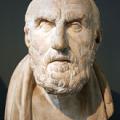62 - We Didn’t Start the Fire: the Stoics on Nature
Peter looks at the Stoic idea of god, a providential fire that pervades nature, and considers their idea of a deterministic and eternally recurring cosmos.
Themes:
• K.A. Algra, “The Early Stoics on the Immobility and Coherence of the Cosmos,” Phronesis 33 (1988), 155-80.
• D. Baltzly, “Stoic Pantheism,” Sophia 34 (2003), 3–33.
• M. Lapidge, “Stoic Cosmology,” in J. Rist (ed.), The Stoics (1978), 161-86.
• A.A. Long, “Soul and Body in Stoicism,” Phronesis 27 (1982), 34-57.
• A.A. Long, “The Stoics on World Conflagration and Everlasting Recurrence,” in R.W. Epp (ed.), Recovering the Stoics (Memphis: 1985), 13-37. [Reprinted in Long, From Epicurus to Epictetus]
• N. Powers, “Plato’s Demiurge as Precursor to the Stoic Providential God,” Classical Quarterly 63 (2013), 713-22.
• R. Salles (ed.), God and Cosmos in Stoicism (Oxford: 2009).
• S. Sambursky, The Physics of the Stoics (London: 1959).







Comments
Comedian
I have been listening to your podcasts at work for two weeks now. It is keeping me company in the windowless (Gilliam's Information Retrieval type) office. Thank you! I tried cheating on you and listening to other podcasts. Enough to say I only lasted 2 minutes. Even though it is hard for me to concentrate on two things at once I am not giving up! What I want to say is that I love the little pauses after your clever jokes. Great stuff. Will you cover continental philosophy?
Divine episode
Dear Mr Adamson,
I really enjoyed this episode. The beginning especially! How beautiful to start the day with the verses of a poem to the divine!
Again, thank you for this valuable work,
Penelope Vlassopoulou
Is the Pneuma a matter?
I always have a hard time calling the Stoics materialist, because they contrast matter, which they regard as utterly unqualified and inert, with the Pneuma/Intelligent design fire/God or as they say the first principle(archai) of the universe.
I think if they are materialist we have to invent a new materialist sect.
Many thanks
Hen
In reply to Is the Pneuma a matter? by Hen
Are the Stoics materialists?
I am not sure I follow you there - "materialist" doesn't to my mind mean "nothing exists other than matter". It means "nothing exists that is not made of matter." And I take it that God, and everything else that exists (though not everything that "subsists," in their terminology) is indeed made of matter.
In reply to Are the Stoics materialists? by Peter Adamson
I'll Bite
If the Materialist position is "A thing really is what it's made of" and it turns out that the only constitutents (what a thing is made of) are one or many kinds of matter, then what is the difference between saying that Materialism means "nothing exists other than matter" versus "nothing exists that is not made of matter"?
In reply to I'll Bite by Otter Bob
Matter
Well, what I meant is that if you think of matter as raw stuff, then materialists don't need to think that everything is just raw stuff: there could be a wide variety of different types of things, like a subtle, all pervading God, that are _made_ of matter. So, an analogy: everything carpenters make is made of wood but they don't make wood, they make tables, chairs, etc.
So my point is that a "materialist" is someone who thinks that everything is made of matter, and since the Stoics do believe this, the fact that they distinguish between matter and God doesn't give us any reason to deny that they are materialists.
In reply to Matter by Peter Adamson
Re: Matter
I agree with your view of the Stoics. But I do want to say that if a materialist takes wood as his raw material, then he should say that tables and chairs and animals and hopes and fears (if he takes them as real) are nothing but wood. If the shape of a table is real, then I suppose he would say that the shape is accidental to the table being wood.
I was listening to a self-identified physicalist lately and he started by saying, "There is nothing but fermions and bosons. That is what reality is composed of." 8 minutes later, upon questioning, he added, "fermions and bosons and everything that is made of fermions and bosons." I took that as a very expansive change in his position since he was willing to admit that most everything we take as real on the macro-level and their relations are made of nothing but fermions and bosons and thus fully real. When a well-known physicist remarked that "real" is used in many ways (giving no indication of who that might have come from), I nearly fell off my chair.
In reply to Re: Matter by Otter Bob
Real
Yes, that's dead right. You are putting your finger on the difference between reductionist (or eliminativist) and non-reductionist accounts of, well, everything. It is one thing to say for instance that mental states are causally brought about by brain states, and another to say that mental states are not real, only brain states are real. I tend to be pretty unsympathetic to eliminativist accounts because it seems needlessly extreme: one thing can be real despite consisting of another thing. I hasten to add that there are also many ways of being non-reductively real - for a good example check out our discussion of Carvaka in the India podcast where we get into emergentism, a bit.
In reply to Real by Peter Adamson
Emergence
I'm having trouble finding the discussion of Carvaka. Can you give me the episode #? For myself, I'm a bit unsympathetic to emergent accounts simply because they don't explain how something entirely new (whole) comes into existence beyond the interaction of the parts. For instance, we can look at all the details of the chemistry involved in infection protection from the initial injury on to the final destruction of certain bacterial cells, but if someone says from all that chemistry emerges the immune response, I don't see it. The immune response is nothing but all those chemical and cellular processes interacting in various ways. But that's another topic. Thanks in advance for the reference.
In reply to Emergence by Otter Bob
reply
India 39-40. I found it by going to the Age of Sutra page and doing a word search for carvaka. A gift from one otter to another (hi, btw. i go by the name Otterlex!)
In reply to reply by Alexander Johnson
Carvaka episode
Yes, that's right - it's really episode 40 where we discuss emergentism but you might want to check out 39 first as background. (Or should I say, you "otter" check it out?)
In reply to reply by Alexander Johnson
Thanks to You Two
for the references to India 39-40. In my advancing years I had forgotten about them. But I thoroughly enjoyed them again, especially 40. I won't go on anymore here about my reservations about emergence even back then.
But I did learn about using the Find icon. Somehow it had disappeared from my address bar but even then I would not have thought about using it on a webpage.
Hey Otterlex--does your name mean Otters Rule! ? (Being somewhat of an anarchistic otter, you'll have to rule me out.)
In reply to Thanks to You Two by Otter Bob
name
Well, other people started calling me that, so i guess they get to decide the meaning. I suppose if we were going to be more accurate hybridization, my name would be Alexvidras or something along that line to mean "defender of otters".
In reply to Are the Stoics materialists? by Peter Adamson
The Stoics are Probably Not Materialists
According to the Stoics, God is not made of matter, if we understand "matter" to mean "the passive principle" and "God" to mean "the active principle". The active principle and the passive principle are two distinct bodies, since they are blended, in the same way that an animal's soul and an animal's body are two distinct, blended bodies. Given this, neither principle is made of the other. Perhaps there is another meaning of "matter" in Stoic physics according to which we could say that the active principle is made of matter, or perhaps there is a modern, non-Stoic meaning of "matter" according to which we could say this; but the primary meaning of the term in Stoicism refers to the passive principle, and the active principle is not made of that body. This is why many people now opt for "corporealism" rather than "materalism" when describing the Stoics' views.
I love the podcast, and I recommend it to my students all the time!
In reply to The Stoics are Probably Not Materialists by Ian H
Stoic "materialism"
Yes that's a good point - it might be better to say "physicalist" though of course in a podcast for a wide audience I tend to go for vocabulary that is more easily understandable. "Materialist" is indeed ambiguous; all I would have meant by it here is that they don't accept that there are immaterial substances as postulated by the Platonists (and indeed Aristotle). But you're right that they don't think that nothing is real apart from matter. I guess that in fact no pre-modern philosophers would have signed up to that proposition, so if one works with that strict definition of "materialism" then there is no pre-modern materialism (except maybe Carvaka in India?).
Thanks for recommending the podcast!
Isn't being upset over
Isn't being upset over predetermination predetermined by God?
Transcriptions
Hello Mr. Adamson,
I'm making a translation to Spanish of the episodes on stoicism for a philosophy club. Do you have transcripts of the shows by any chance?
It would make things way more easy.
Thanks in advance and terrific work,
Ramon
In reply to Transcriptions by Ramon Diaz
Transcriptions
Just send me an email and let me know which ones you need! My email is peter.adamson@lrz.uni-muenchen.de. Great that you are doing this.
In reply to Transcriptions by Ramon Diaz
are you uploading the translation?
Hey that's amazing! it's been somewhat hard to keep up with the english, if you upload them anywhere that would be great to retrace some of the episodes.
In reply to are you uploading the translation? by Julian Calabrese
Spanish version
The plan is now to translate the books into Spanish, I will obviously post here and on social media when that happens!
Phylosophers and religion in this era
Hello Adam! there's something i've been pondering about the interpretation the different schools made about the gods and it's, how did the general public/religious cults of the time faced these ideas?
I remember from the apology of Socrates that one of the big charges presented against him was something along the lines of either atheism or "introducing and exalting new gods", and i can't help to think that the mind philosopher god of aristotle, the absent gods of epicureanism and the gods embedded in the essense of the world of the stoics didn't quite fit the mould of the traditional greek and roman pantheon, did this cause opposition to these schools? were this ideas of the gods more guarded in secrecy by the schools?
anyway, i've been enjoying this podcast immensely and it introduced me to a lot of ideas i've otherwise would've never found, keep up the amazing work!
In reply to Phylosophers and religion in this era by Julian Calabrese
Gods
Yes that's right, one of the charges against Socrates was that he "introduced new gods" which presumably refers to the supernatural "daimon" or "divine sign" that spoke to him to warn against bad decisions. More generally there is a wide variety in the way that the philosophical schools relate to traditional religion. Probably the most "revisionary" would be the Epicureans who attracted a lot of outrage for denying that the gods exercise providence (they did not deny the existence of the gods). The Stoics were careful to say that their theories supported and explained traditional ideas about the gods - check out Cicero's "On the Nature of the Gods" for a summary of both the Stoic and Epicurean positions, plus criticisms from a Skeptical point of view. As for the Platonists, as you'll see when you get to the episodes on late antiquity, some of them (like Iamblichus and Proclus) were strongly motivated by the need to defend traditional pagan religion. So, in general I would say that the mainstream of ancient philosophy was more to support religious beliefs than radically challenge them, even if some philosophers (like Aristotle) suggest that popular beliefs about gods are only a very imprecise version of what is really going on with the divine.
Add new comment